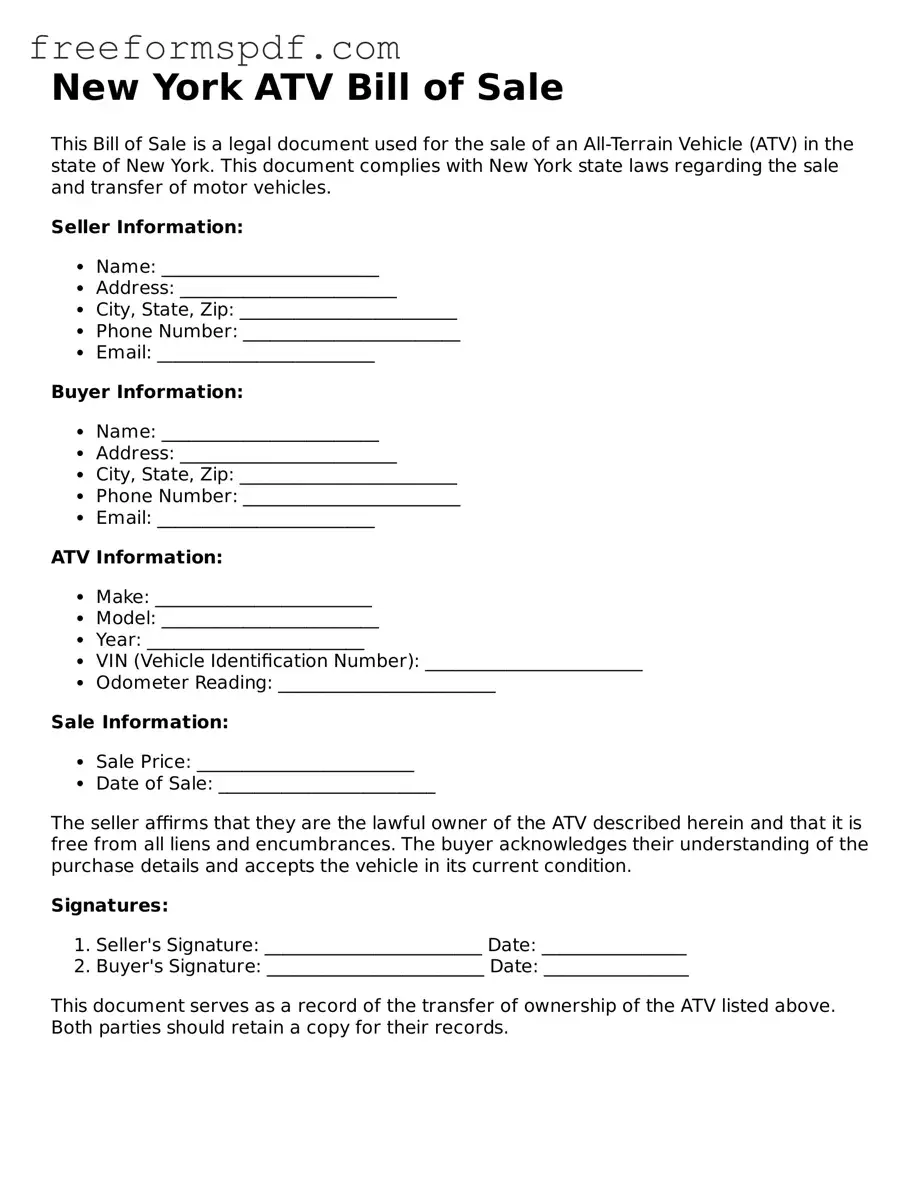Attorney-Verified ATV Bill of Sale Document for New York State
Common mistakes
-
Incorrect Vehicle Information: One common mistake is failing to accurately describe the ATV. Ensure that the make, model, year, and Vehicle Identification Number (VIN) are correct. Any discrepancies can lead to issues down the line.
-
Missing Seller and Buyer Details: Both parties must provide their full names and addresses. Omitting this information can result in confusion and complicate the transfer of ownership.
-
Not Including Sale Price: The sale price must be clearly stated. Leaving this blank can create legal ambiguities and affect tax obligations.
-
Failure to Sign: Both the buyer and seller need to sign the form. A missing signature can invalidate the document, making it unenforceable.
-
Not Dating the Document: Forgetting to include the date of the transaction can lead to complications, especially if any disputes arise later.
-
Ignoring State Requirements: Each state may have specific requirements for an ATV Bill of Sale. Not adhering to New York’s regulations could render the document ineffective.
-
Not Keeping Copies: Failing to make copies of the signed Bill of Sale can be a costly mistake. Both parties should retain a copy for their records.
-
Not Including Additional Terms: If there are any warranties or specific conditions regarding the sale, they should be clearly outlined. Leaving these out can lead to misunderstandings.
-
Overlooking Odometer Disclosure: If applicable, including the odometer reading is crucial. This protects both parties and ensures transparency regarding the vehicle's condition.
Learn More on This Form
-
What is an ATV Bill of Sale in New York?
An ATV Bill of Sale is a legal document that records the sale and transfer of ownership of an all-terrain vehicle (ATV) in New York. This form includes essential details such as the buyer's and seller's names, the vehicle's identification number (VIN), and the sale price. It serves as proof of the transaction and is important for both parties involved.
-
Why do I need an ATV Bill of Sale?
The ATV Bill of Sale is crucial for several reasons. First, it provides legal evidence of the sale, which can protect both the buyer and seller in case of disputes. Second, it helps the buyer register the ATV with the state. Lastly, it may be required by insurance companies to establish ownership before providing coverage.
-
What information is required on the form?
The ATV Bill of Sale should include specific information to be valid. This includes:
- The full names and addresses of both the buyer and seller.
- The ATV's make, model, year, and VIN.
- The sale price and date of the transaction.
- Any warranties or representations made by the seller.
Completing all sections accurately ensures that the document serves its purpose effectively.
-
Do I need to have the ATV Bill of Sale notarized?
In New York, notarization of the ATV Bill of Sale is not mandatory. However, having the document notarized can add an extra layer of security and credibility. It helps verify the identities of the parties involved and can be beneficial if any disputes arise in the future.
Misconceptions
When it comes to the New York ATV Bill of Sale form, several misconceptions can lead to confusion. Understanding these misconceptions is essential for anyone involved in the buying or selling of an ATV.
-
Misconception 1: The Bill of Sale is not necessary for ATV transactions.
Many people believe that a Bill of Sale is optional when buying or selling an ATV. However, having a Bill of Sale is crucial as it serves as a legal document that proves the transaction took place. It protects both the buyer and seller by providing a record of the sale.
-
Misconception 2: The form can be filled out after the sale is completed.
Some individuals think they can complete the Bill of Sale at any time, even after the transaction has occurred. In reality, it should be filled out and signed at the time of sale to ensure accuracy and to capture all necessary details while the information is fresh.
-
Misconception 3: The Bill of Sale must be notarized.
There is a common belief that a notarized Bill of Sale is required for it to be valid. However, in New York, notarization is not mandatory. While it can add an extra layer of security, the document is still legally binding without a notary's signature.
-
Misconception 4: Only the seller needs to keep a copy of the Bill of Sale.
Some people assume that only the seller should retain a copy of the Bill of Sale. In fact, both the buyer and seller should keep a copy for their records. This ensures that both parties have proof of the transaction, which can be helpful in case of future disputes or for registration purposes.
Some Other ATV Bill of Sale State Templates
Printable Atv Bill of Sale Pdf - Includes details for any pre-existing conditions of the ATV.
The California Employment Verification form is a document used to confirm an employee’s job status and details with their current or past employer. This form is an essential tool for various purposes, including loan applications, background checks, and other employment-related processes. For a convenient way to access necessary resources, visit the PDF Documents Hub to fill out the form and get started.
Do I Need a Bill of Sale If I Have the Title in Oregon - Provides a framework for creating a legally binding agreement between two parties.
